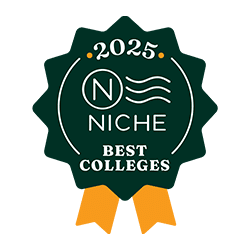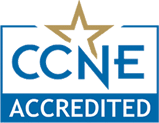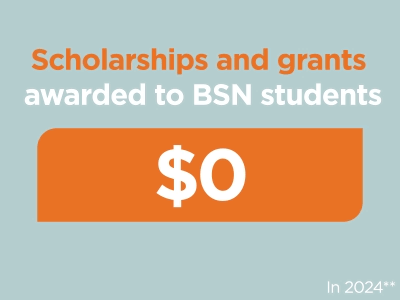Nursing

The WCU Online Store is officially open. Visit Now.


Created to support new students with exceptional first attempt entrance exam scores (83 on the HESI or 66 on the TEASV), this grant is available to BSN or LPN to BSN students starting March 2026 at WCU-Miami. Learn more.
For additional information and eligibility requirements on the New Student Achievement Grant, please visit the Undergraduate On-Ground Scholarships and Grants page on our catalog.Earn your BSN in as few as 39 months at the Accelerated program pace
Go straight into bachelor-level classes
Choose from our Accelerated, Working Professional, and Evening and Weekend paces

Best Colleges for Nursing in Florida

West Coast University Miami has been voted Best School/University in the Best of Miami 2025 Readers’ Poll hosted by the Miami New Times!

WCU-Miami is proud to be the winner of the Silver Award from the Miami Herald for Best College/University!
Optional Accelerated pace, transfer credit acceptance opportunities, and no waitlists so you can start studying now and begin making a difference sooner
Immersive simulation labs where you can master hands-on skills confidently
Career-ready preparation including NCLEX prep and support
Diverse clinical partners in the Miami area where you can gain real-life experience
Florida is one of the top employers for nurses in the United States, ranking third for the highest employment of nurses by state.1 For many of our students, nursing is more than just a career choice. It’s a calling. At WCU-Miami, we want to give you the tools to make a difference in your community, providing care and comfort to those who need it most.
If you’re looking for an accelerated program in Miami that emphasizes hands-on learning, then we invite you to explore our Bachelor of Science in Nursing program. Our nursing students practice in simulation labs that mimic the real world. They provide a safe and controlled environment where students can practice their nursing skills — including blood draws, patient monitoring, and patient crashes — without fear of making mistakes. Once students have mastered their skills and developed confidence, they get real-world experience at a local healthcare facility through their clinical hours.
WCU-Miami provides you with the support you need, including no-cost tutoring, group study spaces, and access to a variety of learning apps. With multiple starts throughout the year and three program paces to choose from, WCU-Miami is helping put your degree within reach.

The baccalaureate degree program in nursing, master’s degree program in nursing, Doctor of Nursing Practice program, and post-graduate APRN certificate program at West Coast University are accredited by the Commission on Collegiate Nursing Education 655 K Street, Suite 750, Washington DC 20001, (202) 877-6791 (www.ccneaccreditation.org).
Hear from Alumna Leslie as she talks about the extensive NCLEX preparation she received while a student in the Bachelor of Science in Nursing program at WCU.
Our simulation center at WCU – Miami is technologically advanced, providing students with the technology they would experience in a hospital or in any medical care facility. It provides them with the opportunity to make mistakes and to learn and grow in a safe, supportive environment.
When you study nursing at WCU-Miami you are never alone. Every part of our program is designed with our students’ needs in mind.
At WCU-Miami, we offer three program paces for our BSN students. Our admissions advisors are available to help you figure out which pace is right for you. Accepted eligible transfer credits can further reduce program completion times and the overall cost of the program.
Here are our available paces for the BSN program:
On-Campus
120 Credits
39 Months
8 Semesters
On-Campus
120 Credits
44 Months
9 Semesters
On-Campus
120 Credits
54 Months
11 Trimesters
This curriculum applies to students matriculating or reentering after December 1, 2022.
All science courses must have been taken within the last five calendar years, unless the student possesses a degree or advanced degree in the specific field of study for which the student is seeking transfer credit. Additional information regarding accepted transfer credit is located in the university’s catalog under Transfer Credit policy or below.
| Category and Requirements | WCU Course Requirements | Transferable / Options |
|---|---|---|
| Foundational Course | FYS 001 (0): First Year Seminar (only offered at Los Angeles and Ontario prior to Spring II 2024)
FHE 100 (3): Foundations of Higher Education (offered at all Campuses; Los Angeles and Ontario Campuses starting Spring II 2024) |
Non-transferable |
| A. Written Communication (6 Semester Credits) | * ENGL 140 (3): Written Communication I * ENGL 240 (3): Written Communication II |
Equivalent to ENGL 140 Equivalent to ENGL 240 |
| B. Oral and Interpersonal Communications (3 Semester Credits) |
*SPCH 142(3): Oral Communication | Equivalent to SPCH 142 |
| C. Critical Thinking and Ethical Reasoning (3 Semester Credits) |
*PHIL 341(3): Critical Reasoning | Equivalent to PHIL 341 |
| D. Quantitative Literacy (6 Semester Credits) |
MATH 108(3): College Mathematics I MATH 211(3): Statistics |
Equivalent to MATH 108
Equivalent to MATH 211 |
| E. Social and Behavioral Sciences Awareness (6 Semester Credits) |
*PSYC 160(3): Psychology *PSYC 290(3): Life Span Psychology |
Equivalent to PSYC 160 Equivalent to PSYC 290 |
| F. Historical, Cultural, and Aesthetic Recognition (3 Semester Credits) |
* HUM 370 (3): Cultural Pluralism | Equivalent to HUM 370 |
| G. Scientific Reasoning (16 Semester Credits) |
|
|
| General Education Capstone (3 Semester Credits) |
CAPS 401(3): General Education Capstone (only offered at Los Angeles, Ontario Campuses prior to Spring II 2024) |
Non-transferable |
| A minimum of 46 credits is required for graduation. | ||
| General Education within the Area of Study | ||
| PATH 370 | Pathophysiology | 3 |
| PHIL 434 | Medical Ethics and Issues | 3 |
| Total Credit Hours: | 6 | |
| Core Nursing Courses | ||
| NURS 100 | Fundamentals of Nursing | 3 |
| NURS 101L | Fundamentals of Nursing Skills Lab | 2 |
| NURS 110 | Introduction to Professional Nursing | 2 |
| NURS 120 | Introduction to Medical Surgical Nursing | 3 |
| NURS 121L-A | Introduction to Medical Surgical Nursing Practicum | 2 |
| NURS 121L-B | Introduction to Medical Surgical Nursing Practicum – On-Campus | 1 |
| NURS 180 | Pharmacology | 3 |
| NURS 190 | Physical Assessment | 2 |
| NURS 201 | Medical Surgical Nursing-Promoting Wellness | 3 |
| NURS 211L | Medical Surgical Nursing | 3 |
| NURS 222 | Mental Health/Psychiatric Nursing: Promoting Wellness in the Mentally Ill | 3 |
| NURS 223L | Mental Health/Psychiatric Nursing: Promoting Wellness Practicum | 2 |
| NURS 225 | Nutrition in Health and Disease | 3 |
| NURS 306 | Expanding Family and Community (OB) | 2 |
| NURS 307 | Developing Family and Community (PEDS) | 2 |
| NURS 316L-A | Expanding and Developing Family and Community Practicum (OB) | 1.5 |
| NURS 317L-A | Developing Family and Community Practicum (PEDS) | 1.5 |
| NURS 340 | Public Health Nursing | 3 |
| NURS 342L | Public Health Nursing Practicum | 2 |
| NURS 350 | Research in Nursing | 3 |
| NURS 420 | Principles of Leadership and Management | 3 |
| NURS 431 | Disaster Management | 2 |
| NURS 440 | Issues and Trends in Nursing | 3 |
| NURS 480 | Advanced Medical Surgical Nursing: Promoting Wellness Practicum | 3 |
| NURS 481L | Advanced Medical Surgical Nursing: Promoting Wellness Practicum | 3 |
| NURS 493* | Integration of Nursing Concepts | 3 |
| NURS 497 | Nursing Capstone | 1 |
| NURS 498L | Integration of Nursing Practices | 3 |
| Total Credit Hours: | 68.0 | |
| Program Credit Distribution | ||
| General Education Semester Credits | 46.0 | |
| General Education within the Area of Study | 6.0 | |
| Core Nursing Courses | 68.0 | |
| Total Program Semester Credits | 120.0 | |
How Much Does the Bachelor of Science in Nursing – Miami Program Cost?
We know school is a substantial commitment. At WCU, we want to equip you with all the information you need to make the right decision for your future.
Our goal is to give you a clear understanding of Miami Bachelor of Science in Nursing tuition costs so you can be well-informed as you navigate the application and enrollment process. To assist you in your decision, we provide a breakdown below of the Bachelor of Science in Nursing program costs in Miami at West Coast University.
We offer several financial aid options — including scholarships, grants, and loan access — to help support your studies and make the program as affordable as possible. For more information about your financial support options, visit our financial aid page.
Estimated Cost of Attendance is comprised of both direct costs and indirect costs, as outlined in the charts below. The purpose of the Cost of Attendance (COA) is to provide students and families with an estimated cost to attend West Coast University. The COA includes both direct and indirect cost estimates and are categorized as follows: (1) Direct costs are paid directly to West Coast University and are shown separately for each program; (2) Indirect costs are not paid to West Coast University and are estimates students may use to budget expenses they may incur while attending school. While actual indirect costs may vary, West Coast University estimates these amounts based on the number of months in an academic year and whether students will live with parents or off campus.
Direct Costs
| Degree Type | Start Fall I 2024 | Start Fall II 2024 |
| Total Program Credits | 120 | 120 |
| Program Length(Full-Time) | 8 semesters | 8 semesters |
| General Education Courses (per credit x 46 credits) | $599 | |
| Core Courses (per credit x. 74 credits) (nursing & non-nursing1) | $799 | |
| Tuition Cost Full-Time Status (12 to 18 credits) | $8,985 | |
| 3/4 Time Status (9 to 11 credits) | $7,446 | |
| 1/2 Time Status (6 to 8 credits) | $5,846 | |
| Less than 1/2 Time Status (per credit if under 6 credits) | $988 | |
| Total Tuition Costs | $86,680 | $71,880 |
| Registration Fee (refundable) | $75 | $75 |
| Estimated Total Book Costs2 | $5,212 | $5,212 |
| Estimated Total Book Shipping Cost2 | $521 | $521 |
| Estimate for Uniforms Fee2 | $250 | $250 |
| Estimate for Supplies & Licensure Preparation Fees2 | $2,345 | $2,345 |
| Technology Fee3 ($100 per semester) | $800 | $800 |
| General Education Resource Fee4 | $500 | $500 |
| Core Nursing Fee5 | $15,000 | |
| Estimated Total Program Costs | $96,383 | $96,583 |
Indirect Costs
| 10 Month Academic Year5 | ||||
| Prior to Fall I 2025 | Starting Fall I 2025 | |||
| with parents | off campus | with parents | off campus | |
| Federal Student Loan Fees | $100 | $100 | $100 | $100 |
| Course Materials (Personal Electronic Device-1st year only) | $1,000 | $1,000 | $1,000 | $1,000 |
| Living Expenses (Food & Housing) | $3,120 | $10,410 | $3,270 | $10,910 |
| Transportation | $2,160 | $2,160 | $2,220 | $2,220 |
| Miscellaneous Personal Expenses | $7,070 | $7,070 | $7,070 | $7,070 |
| Total | $13,450 | $20,740 | $13,660 | $21,300 |
*Upon enrollment, students select Accelerated, Working Professional or Evening and Weekend, which will determine the pace at which students complete their degree. In most cases, students that select Accelerated will attempt two courses per term, and students that select Working Professional will attempt one course a term.
1 Non-nursing core includes PATH 370 and PHIL 434.
2 The Estimated Book, Uniform, and Supply costs reflect the Manufacturer’s Suggested Retail Price totals compiled in December 2024 and are subject to change.
3 Technology Fee includes student technical support, Office 365, blended and online course delivery/learning management system, mobile app, student portal technology and access, and required electronic course materials/software.
4 The General Education Resource Fee includes costs associated with lab supplies and materials, Labster virtual labs and simulations, and Tutor.com access.
5 The Core Nursing Fee will be billed each semester in which Core Nursing courses are scheduled and covers costs associated with background checks and drug screenings; the operation of equipment for Simulation, Technology, including but not limited to the establishment, scheduling, coordination, site visits, on-going management, and other expenses related to clinical activities. 5 Core Nursing Semesters multiplied by $3,090 per Core Nursing Semester effective Fall I 2025 and $3,000 prior to Fall I 2025.
Note 1: Students who wish to take Challenge Exams will be subject to a fee of $100 for each Challenge exam. Please see the campus Student Accounts Office for a full price listing.
Note 2: Course Audit Policy – Students auditing a course are not charged tuition or fees for the audited course. However, if a student enrolls in both an audit course and a credit-bearing course in the same semester/trimester, they will be responsible for the tuition and applicable fees associated with the credit-bearing course.
Direct Costs
| Degree Type | Start Prior to Fall II 2024 (Effective Spring II 2025) |
Start On and After Fall II 2024 (Effective Spring II 2025) |
| Total Program Credits | 120 | 120 |
| Program Length(Full-Time) | 8 semesters | 8 semesters |
| General Education Courses (per credit x 46 credits) | $599 | |
| Core Courses (per credit x. 74 credits) (nursing & non-nursing1) | $799 | |
| Tuition Cost Full-Time Status (12 to 18 credits) | $8,985 | |
| 3/4 Time Status (9 to 11 credits) | $7,446 | |
| 1/2 Time Status (6 to 8 credits) | $5,846 | |
| Less than 1/2 Time Status (per credit if under 6 credits) | $988 | |
| Total Tuition Costs | $86,680 | $71,880 |
| Registration Fee (refundable) | $75 | $75 |
| Estimated Total Book Costs2 | $4,164 | $4,164 |
| Estimated Total Book Shipping Cost2 | $416 | $416 |
| Estimate for Uniforms Fee2 | $250 | $250 |
| Estimate for Supplies & Licensure Preparation Fees2 | $4,200 | $4,200 |
| Technology Fee3 ($100 per semester) | $800 | $800 |
| General Education Resource Fee4 | $500 | $500 |
| Core Nursing Fee5 | $15,000 | |
| Estimated Total Program Costs | $97,085 | $97,285 |
Indirect Costs
| 10 Month Academic Year5 | ||||
| Prior to Fall I 2025 | Starting Fall I 2025 | |||
| with parents | off campus | with parents | off campus | |
| Federal Student Loan Fees | $100 | $100 | $100 | $100 |
| Course Materials (Personal Electronic Device-1st year only) | $1,000 | $1,000 | $1,000 | $1,000 |
| Living Expenses (Food & Housing) | $3,120 | $10,410 | $3,270 | $10,910 |
| Transportation | $2,160 | $2,160 | $2,220 | $2,220 |
| Miscellaneous Personal Expenses | $7,070 | $7,070 | $7,070 | $7,070 |
| Total | $13,450 | $20,740 | $13,660 | $21,300 |
*Upon enrollment, students select Accelerated, Working Professional or Evening and Weekend, which will determine the pace at which students complete their degree. In most cases, students that select Accelerated will attempt two courses per term, and students that select Working Professional will attempt one course a term.
1 Non-nursing core includes PATH 370 and PHIL 434.
2 The Estimated Book, Uniform, and Supply costs reflect the Manufacturer’s Suggested Retail Price totals compiled in December 2024 and are subject to change.
3 Technology Fee includes student technical support, Office 365, blended and online course delivery/learning management system, mobile app, student portal technology and access, and required electronic course materials/software.
4 The General Education Resource Fee includes costs associated with lab supplies and materials, Labster virtual labs and simulations, and Tutor.com access.
5 The Core Nursing Fee will be billed each semester in which Core Nursing courses are scheduled and covers costs associated with background checks and drug screenings; the operation of equipment for Simulation, Technology, including but not limited to the establishment, scheduling, coordination, site visits, on-going management, and other expenses related to clinical activities. 5 Core Nursing Semesters multiplied by $3,090 per Core Nursing Semester effective Fall I 2025 and $3,000 prior to Fall I 2025.
Note 1: Students who wish to take Challenge Exams will be subject to a fee of $100 for each Challenge exam. Please see the campus Student Accounts Office for a full price listing.
Note 2: Course Audit Policy – Students auditing a course are not charged tuition or fees for the audited course. However, if a student enrolls in both an audit course and a credit-bearing course in the same semester/trimester, they will be responsible for the tuition and applicable fees associated with the credit-bearing course.
Direct Costs
| Degree Type | Start Fall II 2024
(Effective Fall I 2025) |
Start Fall II 2024
(Effective Fall I 2025) |
| Total Program Credits | 120 | 120 |
| Program Length(Full-Time) | 8 semesters | 8 semesters |
| General Education Courses (per credit x 46 credits) | $617 | |
| Core Courses (per credit x. 74 credits) (nursing & non-nursing1) | $823 | |
| Tuition Cost Full-Time Status (12 to 18 credits) | $9,255 | |
| 3/4 Time Status (9 to 11 credits) | $7,669 | |
| 1/2 Time Status (6 to 8 credits) | $6,021 | |
| Less than 1/2 Time Status (per credit if under 6 credits) | $1,018 | |
| Total Tuition Costs | $89,284 | $74,040 |
| Registration Fee (refundable) | $75 | $75 |
| Estimated Total Book Costs2 | $3,987 | $3,987 |
| Estimated Total Book Shipping Cost2 | $399 | $399 |
| Estimate for Uniforms Fee2 | $250 | $250 |
| Estimate for Supplies & Licensure Preparation Fees2 | $4,200 | $4,200 |
| Technology Fee3 ($100 per semester) | $800 | $800 |
| General Education Resource Fee4 | $500 | $500 |
| Core Nursing Fee5 | $15,450 | |
| Estimated Total Program Costs | $99,495 | $99,701 |
Indirect Costs
| 10 Month Academic Year5 | ||||
| Prior to Fall I 2025 | Starting Fall I 2025 | |||
| with parents | off campus | with parents | off campus | |
| Federal Student Loan Fees | $100 | $100 | $100 | $100 |
| Course Materials (Personal Electronic Device-1st year only) | $1,000 | $1,000 | $1,000 | $1,000 |
| Living Expenses (Food & Housing) | $3,120 | $10,410 | $3,270 | $10,910 |
| Transportation | $2,160 | $2,160 | $2,220 | $2,220 |
| Miscellaneous Personal Expenses | $7,070 | $7,070 | $7,070 | $7,070 |
| Total | $13,450 | $20,740 | $13,660 | $21,300 |
*Upon enrollment, students select Accelerated, Working Professional or Evening and Weekend, which will determine the pace at which students complete their degree. In most cases, students that select Accelerated will attempt two courses per term, and students that select Working Professional will attempt one course a term.
1 Non-nursing core includes PATH 370 and PHIL 434.
2 The Estimated Book, Uniform, and Supply costs reflect the Manufacturer’s Suggested Retail Price totals compiled in December 2024 and are subject to change.
3 Technology Fee includes student technical support, Office 365, blended and online course delivery/learning management system, mobile app, student portal technology and access, and required electronic course materials/software.
4 The General Education Resource Fee includes costs associated with lab supplies and materials, Labster virtual labs and simulations, and Tutor.com access.
5 The Core Nursing Fee will be billed each semester in which Core Nursing courses are scheduled and covers costs associated with background checks and drug screenings; the operation of equipment for Simulation, Technology, including but not limited to the establishment, scheduling, coordination, site visits, on-going management, and other expenses related to clinical activities. 5 Core Nursing Semesters multiplied by $3,090 per Core Nursing Semester effective Fall I 2025 and $3,000 prior to Fall I 2025.
Note 1: Students who wish to take Challenge Exams will be subject to a fee of $100 for each Challenge exam. Please see the campus Student Accounts Office for a full price listing.
Note 2: Course Audit Policy – Students auditing a course are not charged tuition or fees for the audited course. However, if a student enrolls in both an audit course and a credit-bearing course in the same semester/trimester, they will be responsible for the tuition and applicable fees associated with the credit-bearing course.
Tuition and Fees
| Degree Type | Start Fall I 2024 | Start Fall II 2024 |
| Total Program Credits | 120 | 120 |
| Program Length(Full-Time) | 11 semesters | 11 semesters |
| General Education Courses (per credit x 46 credits) | $599 | |
| Core Courses(per credit x. 74 credits) (nursing & non-nursing1) | $799 | |
| Tuition Cost Full-Time Status (12 to 18 credits) | $7,472 | |
| 3/4 Time Status (9 to 11 credits) | $6,202 | |
| 1/2 Time Status (6 to 8 credits) | $4,857 | |
| Less than 1/2 Time Status (per credit if under 6 credits) | $988 | |
| Total Tuition Costs | $86,680 | $71,882 |
| Registration Fee (refundable) | $75 | $75 |
| Estimated Total Book Costs1 | $5,212 | $5,212 |
| Estimated Total Book Shipping Cost1 | $521 | $521 |
| Estimate for Uniforms Fee2 | $250 | $250 |
| Estimate for Supplies & Licensure Preparation Fees2 | $2,345 | $2,345 |
| Technology Fee2 ($100 per semester) | $1,100 | $1,100 |
| General Education Resource Fee4 | $500 | $500 |
| Core Nursing Fee5 | $15,000 | |
| Estimated Total Program Costs | $96,683 | $96,885 |
Indirect Costs
| 10 Month Academic Year5 | ||||
| Prior to Fall I 2025 | Starting Fall I 2025 | |||
| with parents | off campus | with parents | off campus | |
| Federal Student Loan Fees | $100 | $100 | $100 | $100 |
| Course Materials (Personal Electronic Device-1st year only) | $1,000 | $1,000 | $1,000 | $1,000 |
| Living Expenses (Food & Housing) | $3,120 | $10,410 | $3,270 | $10,910 |
| Transportation | $2,160 | $2,160 | $2,220 | $2,220 |
| Miscellaneous Personal Expenses | $7,070 | $7,070 | $7,070 | $7,070 |
| Total | $13,450 | $20,740 | $13,660 | $21,300 |
1 Non-nursing core includes PATH 370 and PHIL 434.
2 The Estimated Book, Uniform, and Supply costs reflect the Manufacturer’s Suggested Retail Price totals compiled in January 2022 and are subject to change.
3 Technology Fee includes student technical support, Office 365, blended and online course delivery/learning management system, mobile app, student portal technology and access, and required electronic course materials/software.
4 The General Education Resource Fee includes costs associated with ATI Smart Prep materials. The General Education Resource Fee will be waived for Active Duty, Active Duty Spouse, Reserve, Reserve Spouse, Veterans, Veteran Spouse, Department of Defense employees, dependents utilizing parent’s veteran’s education benefits, and Veterans Affairs employees.
5 The Core Nursing Fee will be billed each semester in which Core Nursing courses are scheduled and covers costs associated with background checks and drug screenings; the operation of equipment for Simulation, Technology, including but not limited to the establishment, scheduling, coordination, site visits, on-going management, and other expenses related to clinical activities. 5 Core Nursing Semesters multiplied by $3,090 per Core Nursing Semester
Note 1: Students who wish to take Challenge Exams will be subject to a fee of $100 for each Challenge exam. Please see the campus Bursar Office for a full price listing.
Note 2: Course Audits – If a course(s) is being audited. Credits for these courses will be included for the student’s schedule status for billing, based on the schedule statuses and amounts shown above. Pre-licensure Nursing students should refer to the program’s Dismissal Policy for information surrounding course auditing. Students enrolled less than 1/2-Time are billed by the credit hour.
Direct Costs
| Degree Type | Start Prior to Fall II 2024 (Effective Spring II 2025) |
Start On and After Fall II 2024 (Effective Spring II 2025) |
| Total Program Credits | 120 | 120 |
| Program Length(Full-Time) | 11 semesters | 11 semesters |
| General Education Courses (per credit x 46 credits) | $599 | |
| Core Courses (per credit x. 74 credits) (nursing & non-nursing1) | $799 | |
| Tuition Cost Full-Time Status (12 to 18 credits) | $7,472 | |
| 3/4 Time Status (9 to 11 credits) | $6,202 | |
| 1/2 Time Status (6 to 8 credits) | $4,857 | |
| Less than 1/2 Time Status (per credit if under 6 credits) | $988 | |
| Total Tuition Costs | $86,680 | $71,882 |
| Registration Fee (refundable) | $75 | $75 |
| Estimated Total Book Costs2 | $4,164 | $4,164 |
| Estimated Total Book Shipping Cost2 | $416 | $416 |
| Estimate for Uniforms Fee2 | $250 | $250 |
| Estimate for Supplies & Licensure Preparation Fees2 | $4,200 | $4,200 |
| Technology Fee3 ($100 per semester) | $1,100 | $1,100 |
| General Education Resource Fee4 | $500 | $500 |
| Core Nursing Fee5 | $15,000 | |
| Estimated Total Program Costs | $97,385 | $97,587 |
Indirect Costs
| 10 Month Academic Year5 | ||||
| Prior to Fall 1 2025 | Starting Fall 1 2025 | |||
| with parents | off campus | with parents | off campus | |
| Federal Student Loan Fees | $100 | $100 | $100 | $100 |
| Course Materials (Personal Electronic Device-1st year only) | $1,000 | $1,000 | $1,000 | $1,000 |
| Living Expenses (Food & Housing) | $3,120 | $10,410 | $3,270 | $10,910 |
| Transportation | $2,160 | $2,160 | $2,220 | $2,220 |
| Miscellaneous Personal Expenses | $7,070 | $7,070 | $7,070 | $7,070 |
| Total | $13,450 | $20,740 | $13,660 | $21,300 |
*Upon enrollment, students select Accelerated, Working Professional or Evening and Weekend, which will determine the pace at which students complete their degree. In most cases, students that select Accelerated will attempt two courses per term, and students that select Working Professional will attempt one course a term.
1 Non-nursing core includes PATH 370 and PHIL 434.
2 The Estimated Book, Uniform, and Supply costs reflect the Manufacturer’s Suggested Retail Price totals compiled in December 2024 and are subject to change.
3 Technology Fee includes student technical support, Office 365, blended and online course delivery/learning management system, mobile app, student portal technology and access, and required electronic course materials/software.
4 The General Education Resource Fee includes costs associated with lab supplies and materials, Labster virtual labs and simulations, and Tutor.com access.
5 The Core Nursing Fee will be billed each semester in which Core Nursing courses are scheduled and covers costs associated with background checks and drug screenings; the operation of equipment for Simulation, Technology, including but not limited to the establishment, scheduling, coordination, site visits, on-going management, and other expenses related to clinical activities. 5 Core Nursing Semesters multiplied by $3,090 per Core Nursing Semester effective Fall I 2025 and $3,000 prior to Fall I 2025.
Note 1: Students who wish to take Challenge Exams will be subject to a fee of $100 for each Challenge exam. Please see the campus Student Accounts Office for a full price listing.
Note 2: Course Audit Policy – Students auditing a course are not charged tuition or fees for the audited course. However, if a student enrolls in both an audit course and a credit-bearing course in the same semester/trimester, they will be responsible for the tuition and applicable fees associated with the credit-bearing course.
Tuition and Fees
| Degree Type | Start Fall II 2024
(Effective Fall I 2025) |
Start Fall II 2024
(Effective Fall I 2025) |
| Total Program Credits | 120 | 120 |
| Program Length(Full-Time) | 11 semesters | 11 semesters |
| General Education Courses (per credit x 46 credits) | $617 | |
| Core Courses(per credit x. 74 credits) (nursing & non-nursing1) | $823 | |
| Tuition Cost Full-Time Status (12 to 18 credits) | $7,696 | |
| 3/4 Time Status (9 to 11 credits) | $6,388 | |
| 1/2 Time Status (6 to 8 credits) | $5,002 | |
| Less than 1/2 Time Status (per credit if under 6 credits) | $1,018 | |
| Total Tuition Costs | $89,284 | $74,036 |
| Registration Fee (refundable) | $75 | $75 |
| Estimated Total Book Costs2 | $3,987 | $3,987 |
| Estimated Total Book Shipping Cost2 | $399 | $399 |
| Estimate for Uniforms Fee2 | $250 | $250 |
| Estimate for Supplies & Licensure Preparation Fees2 | $4,200 | $4,200 |
| Technology Fee3 ($100 per semester) | $1,100 | $1,100 |
| General Education Resource Fee4 | $500 | $500 |
| Core Nursing Fee5 | $15,450 | |
| Estimated Total Program Costs | $99,795 | $99,997 |
Indirect Costs
| 10 Month Academic Year5 | ||||
| Prior to Fall 1 2025 | Starting Fall 1 2025 | |||
| with parents | off campus | with parents | off campus | |
| Federal Student Loan Fees | $100 | $100 | $100 | $100 |
| Course Materials (Personal Electronic Device-1st year only) | $1,000 | $1,000 | $1,000 | $1,000 |
| Living Expenses (Food & Housing) | $3,120 | $10,410 | $3,270 | $10,910 |
| Transportation | $2,160 | $2,160 | $2,220 | $2,220 |
| Miscellaneous Personal Expenses | $7,070 | $7,070 | $7,070 | $7,070 |
| Total | $13,450 | $20,740 | $13,660 | $21,300 |
* Upon enrollment, students select Accelerated, Working Professional or Evening and Weekend, which will determine the pace at which students complete their degree. In most cases, students that select Accelerated will attempt two courses per term, and students that select Working Professional will attempt one course a term.
1 Non-nursing core includes PATH 370 and PHIL 434.
2 The Estimated Book, Uniform, and Supply costs reflect the Manufacturer’s Suggested Retail Price totals compiled in January 2022 and are subject to change.
3 Technology Fee includes student technical support, Office 365, blended and online course delivery/learning management system, mobile app, student portal technology and access, and required electronic course materials/software.
4 The General Education Resource Fee includes costs associated with ATI Smart Prep materials. The General Education Resource Fee will be waived for Active Duty, Active Duty Spouse, Reserve, Reserve Spouse, Veterans, Veteran Spouse, Department of Defense employees, dependents utilizing parent’s veteran’s education benefits, and Veterans Affairs employees.
5 The Core Nursing Fee will be billed each semester in which Core Nursing courses are scheduled and covers costs associated with background checks and drug screenings; the operation of equipment for Simulation, Technology, including but not limited to the establishment, scheduling, coordination, site visits, on-going management, and other expenses related to clinical activities. 5 Core Nursing Semesters multiplied by $3,090 per Core Nursing Semester
Note 1: Students who wish to take Challenge Exams will be subject to a fee of $100 for each Challenge exam. Please see the campus Bursar Office for a full price listing.
Note 2: Course Audits – If a course(s) is being audited. Credits for these courses will be included for the student’s schedule status for billing, based on the schedule statuses and amounts shown above. Pre-licensure Nursing students should refer to the program’s Dismissal Policy for information surrounding course auditing. Students enrolled less than 1/2-Time are billed by the credit hour.
Direct Costs
| Degree Type | Start Fall I 2024 | Start Fall II 2024 |
| Total Program Credits | 120 | 120 |
| Program Length(Full-Time) | 9 semesters | 9 semesters |
| General Education Courses (per credit x 46 credits) | $599 | |
| Core Courses (per credit x. 74 credits) (nursing & non-nursing1) | $799 | |
| Tuition Cost Full-Time Status (12 to 18 credits) | $8,300 | |
| 3/4 Time Status (9 to 11 credits) | $6,889 | |
| 1/2 Time Status (6 to 8 credits) | $5,395 | |
| Less than 1/2 Time Status (per credit if under 6 credits) | $988 | |
| Total Tuition Costs | $86,680 | $71,878 |
| Registration Fee (refundable) | $75 | $75 |
| Estimated Total Book Costs2 | $5,212 | $5,212 |
| Estimated Total Book Shipping Cost2 | $521 | $521 |
| Estimate for Uniforms Fee2 | $250 | $250 |
| Estimate for Supplies & Licensure Preparation Fees2 | $2,345 | $2,345 |
| Technology Fee3 ($100 per semester) | $900 | $900 |
| General Education Resource Fee4 | $500 | $500 |
| Core Nursing Fee5 | $15,000 | |
| Estimated Total Program Costs | $96,483 | $96,681 |
Indirect Costs
| 10 Month Academic Year5 | ||||
| Prior to Fall I 2025 | Starting Fall I 2025 | |||
| with parents | off campus | with parents | off campus | |
| Federal Student Loan Fees | $100 | $100 | $100 | $100 |
| Course Materials (Personal Electronic Device-1st year only) | $1,000 | $1,000 | $1,000 | $1,000 |
| Living Expenses (Food & Housing) | $3,120 | $10,410 | $3,270 | $10,910 |
| Transportation | $2,160 | $2,160 | $2,220 | $2,220 |
| Miscellaneous Personal Expenses | $7,070 | $7,070 | $7,070 | $7,070 |
| Total | $13,450 | $20,740 | $13,660 | $21,300 |
*Upon enrollment, students select Accelerated, Working Professional or Evening and Weekend, which will determine the pace at which students complete their degree. In most cases, students that select Accelerated will attempt two courses per term, and students that select Working Professional will attempt one course a term.
1 Non-nursing core includes PATH 370 and PHIL 434.
2 The Estimated Book, Uniform, and Supply costs reflect the Manufacturer’s Suggested Retail Price totals compiled in December 2024 and are subject to change.
3 Technology Fee includes student technical support, Office 365, blended and online course delivery/learning management system, mobile app, student portal technology and access, and required electronic course materials/software.
4 The General Education Resource Fee includes costs associated with lab supplies and materials, Labster virtual labs and simulations, and Tutor.com access.
5 The Core Nursing Fee will be billed each semester in which Core Nursing courses are scheduled and covers costs associated with background checks and drug screenings; the operation of equipment for Simulation, Technology, including but not limited to the establishment, scheduling, coordination, site visits, on-going management, and other expenses related to clinical activities. 6 Core Nursing Semesters multiplied by $2,575 per Core Nursing Semester effective Fall I 2025 and $2,500 prior to Fall I 2025.
Note 1: Students who wish to take Challenge Exams will be subject to a fee of $100 for each Challenge exam. Please see the campus Student Accounts Office for a full price listing.
Note 2: Course Audit Policy – Students auditing a course are not charged tuition or fees for the audited course. However, if a student enrolls in both an audit course and a credit-bearing course in the same semester/trimester, they will be responsible for the tuition and applicable fees associated with the credit-bearing course.
Direct Costs
| Degree Type | Start Prior to Fall II 2024 (Effective Spring II 2025) |
Start On and After Fall II 2024 (Effective Spring II 2025) |
| Total Program Credits | 120 | 120 |
| Program Length(Full-Time) | 9 semesters | 9 semesters |
| General Education Courses (per credit x 46 credits) | $599 | |
| Core Courses (per credit x. 74 credits) (nursing & non-nursing1) | $799 | |
| Tuition Cost Full-Time Status (12 to 18 credits) | $8,300 | |
| 3/4 Time Status (9 to 11 credits) | $6,889 | |
| 1/2 Time Status (6 to 8 credits) | $5,395 | |
| Less than 1/2 Time Status (per credit if under 6 credits) | $988 | |
| Total Tuition Costs | $86,680 | $71,878 |
| Registration Fee (refundable) | $75 | $75 |
| Estimated Total Book Costs2 | $4,164 | $4,164 |
| Estimated Total Book Shipping Cost2 | $416 | $416 |
| Estimate for Uniforms Fee2 | $250 | $250 |
| Estimate for Supplies & Licensure Preparation Fees2 | $4,200 | $4,200 |
| Technology Fee3 ($100 per semester) | $900 | $900 |
| General Education Resource Fee4 | $500 | $500 |
| Core Nursing Fee5 | $15,000 | |
| Estimated Total Program Costs | $97,185 | $97,383 |
Indirect Costs
| 10 Month Academic Year5 | ||||
| Prior to Fall I 2025 | Starting Fall I 2025 | |||
| with parents | off campus | with parents | off campus | |
| Federal Student Loan Fees | $100 | $100 | $100 | $100 |
| Course Materials (Personal Electronic Device-1st year only) | $1,000 | $1,000 | $1,000 | $1,000 |
| Living Expenses (Food & Housing) | $3,120 | $10,410 | $3,270 | $10,910 |
| Transportation | $2,160 | $2,160 | $2,220 | $2,220 |
| Miscellaneous Personal Expenses | $7,070 | $7,070 | $7,070 | $7,070 |
| Total | $13,450 | $20,740 | $13,660 | $21,300 |
*Upon enrollment, students select Accelerated, Working Professional or Evening and Weekend, which will determine the pace at which students complete their degree. In most cases, students that select Accelerated will attempt two courses per term, and students that select Working Professional will attempt one course a term.
1 Non-nursing core includes PATH 370 and PHIL 434.
2 The Estimated Book, Uniform, and Supply costs reflect the Manufacturer’s Suggested Retail Price totals compiled in December 2024 and are subject to change.
3 Technology Fee includes student technical support, Office 365, blended and online course delivery/learning management system, mobile app, student portal technology and access, and required electronic course materials/software.
4 The General Education Resource Fee includes costs associated with lab supplies and materials, Labster virtual labs and simulations, and Tutor.com access.
5 The Core Nursing Fee will be billed each semester in which Core Nursing courses are scheduled and covers costs associated with background checks and drug screenings; the operation of equipment for Simulation, Technology, including but not limited to the establishment, scheduling, coordination, site visits, on-going management, and other expenses related to clinical activities. 6 Core Nursing Semesters multiplied by $2,575 per Core Nursing Semester effective Fall I 2025 and $2,500 prior to Fall I 2025.
Note 1: Students who wish to take Challenge Exams will be subject to a fee of $100 for each Challenge exam. Please see the campus Student Accounts Office for a full price listing.
Note 2: Course Audit Policy – Students auditing a course are not charged tuition or fees for the audited course. However, if a student enrolls in both an audit course and a credit-bearing course in the same semester/trimester, they will be responsible for the tuition and applicable fees associated with the credit-bearing course.
Direct Costs
| Degree Type | Start Prior to Fall II 2024 (Effective Spring II 2025) |
Start On and After Fall II 2024 (Effective Spring II 2025) |
| Total Program Credits | 120 | 120 |
| Program Length(Full-Time) | 9 semesters | 9 semesters |
| General Education Courses (per credit x 46 credits) | $617 | |
| Core Courses (per credit x. 74 credits) (nursing & non-nursing1) | $823 | |
| Tuition Cost Full-Time Status (12 to 18 credits) | $8,549 | |
| 3/4 Time Status (9 to 11 credits) | $7,096 | |
| 1/2 Time Status (6 to 8 credits) | $5,557 | |
| Less than 1/2 Time Status (per credit if under 6 credits) | $1,018 | |
| Total Tuition Costs | $89,284 | $74,035 |
| Registration Fee (refundable) | $75 | $75 |
| Estimated Total Book Costs2 | $3,987 | $3,987 |
| Estimated Total Book Shipping Cost2 | $399 | $399 |
| Estimate for Uniforms Fee2 | $250 | $250 |
| Estimate for Supplies & Licensure Preparation Fees2 | $4,200 | $4,200 |
| Technology Fee3 ($100 per semester) | $900 | $900 |
| General Education Resource Fee4 | $500 | $500 |
| Core Nursing Fee5 | $15,450 | |
| Estimated Total Program Costs | $99,595 | $99,796 |
Indirect Costs
| 10 Month Academic Year5 | ||||
| Prior to Fall I 2025 | Starting Fall I 2025 | |||
| with parents | off campus | with parents | off campus | |
| Federal Student Loan Fees | $100 | $100 | $100 | $100 |
| Course Materials (Personal Electronic Device-1st year only) | $1,000 | $1,000 | $1,000 | $1,000 |
| Living Expenses (Food & Housing) | $3,120 | $10,410 | $3,270 | $10,910 |
| Transportation | $2,160 | $2,160 | $2,220 | $2,220 |
| Miscellaneous Personal Expenses | $7,070 | $7,070 | $7,070 | $7,070 |
| Total | $13,450 | $20,740 | $13,660 | $21,300 |
*Upon enrollment, students select Accelerated, Working Professional or Evening and Weekend, which will determine the pace at which students complete their degree. In most cases, students that select Accelerated will attempt two courses per term, and students that select Working Professional will attempt one course a term.
1 Non-nursing core includes PATH 370 and PHIL 434.
2 The Estimated Book, Uniform, and Supply costs reflect the Manufacturer’s Suggested Retail Price totals compiled in December 2024 and are subject to change.
3 Technology Fee includes student technical support, Office 365, blended and online course delivery/learning management system, mobile app, student portal technology and access, and required electronic course materials/software.
4 The General Education Resource Fee includes costs associated with lab supplies and materials, Labster virtual labs and simulations, and Tutor.com access.
5 The Core Nursing Fee will be billed each semester in which Core Nursing courses are scheduled and covers costs associated with background checks and drug screenings; the operation of equipment for Simulation, Technology, including but not limited to the establishment, scheduling, coordination, site visits, on-going management, and other expenses related to clinical activities. 6 Core Nursing Semesters multiplied by $2,575 per Core Nursing Semester effective Fall I 2025 and $2,500 prior to Fall I 2025.
Note 1: Students who wish to take Challenge Exams will be subject to a fee of $100 for each Challenge exam. Please see the campus Student Accounts Office for a full price listing.
Note 2: Course Audit Policy – Students auditing a course are not charged tuition or fees for the audited course. However, if a student enrolls in both an audit course and a credit-bearing course in the same semester/trimester, they will be responsible for the tuition and applicable fees associated with the credit-bearing course.
For Admissibility into the BSN & LVN/LPN to BSN Program, Applicants Must Meet the Following Requirements:
Pre-Licensure Nursing Requirements prior to clinical assignments (ADN, BSN & LPN to BSN):
To receive transfer credit for this program, previous General Education course must have achieve a grade of at least a “C”, and Core courses require a minimum grade of a “C+”. Approval on transfer credit is based on the program’s discretion.
BSN and LVN/LPN-BSN applicants requesting transfer credit evaluation must provide official transcripts by the Add/Drop deadline on the second Tuesday of the term. All general education, prerequisite, and core nursing coursework must have been taken at an appropriately accredited institution. For nursing credits to be considered for transfer credit, there can be only one year between the end of the last nursing course taken at a previous institution and the beginning of the first course at West Coast University. Exceptions may be considered. Science courses must be taken within the last five years to be accepted for transfer credit. Course syllabi for courses previously taken at another nursing program should be submitted for review to the campus dean for nursing. The maximum allowable transfer credits applied to the BSN program shall not exceed 52 credits of general education, and for the ADN (Florida only) program shall not exceed 27 credits of general education. See the Challenge Credit policy for additional information on receiving nursing credit for previously completed nursing courses. Authority for all final transfer credit decisions is given to the Program Dean/Chair.
Transfer credit will not be awarded based on unofficial transcripts, however, students may be scheduled for their first semester of courses based on unofficial transfer credit review . Financial packaging for the first semester will be estimated without transfer credit unless/until official transcripts are received and evaluated. If transfer credit is evaluated after the add/drop date of the first semester, it will be reflected in financial aid offers for the subsequent semester.
Individuals who are concurrently enrolled at another institution at the time of their matriculation to West Coast University, may be allowed to request transfer credit for courses that are in-progress. In this situation, official transcripts must be received by the end of the first term of matriculation in order to receive transfer credit.
All applicants who are veterans or seeking transfer credit must submit all official applicable postsecondary transcripts by the Add/Drop deadline on the second Tuesday of the term regardless of applicable transfer credits for timely certification of the veterans request for benefits and receipt of funds. Please see the Veterans Educational Benefits policy in the Financial Policies and Information Section of the Catalog.
For additional information, visit our catalog.
New academic terms begin, on average, every 10 weeks. To get an idea of when each term starts and ends, view our Academic Calendar.

According to the U.S. Bureau of Labor Statistics, Florida is the third highest employer of registered nurses (RNs). The Miami-Fort Lauderdale-West Palm Beach metro, specifically, is among the top 10 U.S. metropolitan areas with the highest RN employment level.
Pursuing your BSN degree in Florida can empower you to make a meaningful impact on the health of individuals and communities.
Read More About Becoming a Nurse in Florida

At the WCU-Miami campus, we provide our Florida nursing students with technologically advanced simulation labs where they can practice their skills. Get hands-on practice using manikins that mimic real human patients. They have blood pressures that can rise and drop. Their pupils dilate. They show signs of pain, and they can even give birth!
Using these manikins and our hospital setups, you’ll be able to work through different scenarios while getting immediate feedback from your instructors. The WCU-Miami simulation labs let you work through scenarios in:
Wondering what it’s like to reinforce your nursing knowledge in WCU-Miami’s simulation lab? Hear from WCU SIM lab instructor Dr. Miriam S. about what to expect during your hands-on training and why these high-fidelity simulations offer the perfect learning opportunity.3

WCU is committed to helping aspiring nurses access quality education. WCU-Miami has dedicated institutional scholarships and grants for BSN students to help reduce out-of-pocket costs and support your educational journey.
Our financial aid team can help identify available institutional scholarships and offer guidance on the application process. Students in the Miami BSN program may also be eligible for external grants and scholarships.3
Students may also be eligible for Title IV federal financial aid or other education financing options to help fund their educational journey.
A WCU financial aid advisor can help you explore your Miami BSN scholarship options and determine which forms of financial assistance may qualify for.
Students entering the Miami BSN program with eligible transfer credits may be able to complete their degree in less time and at a reduced cost.
We’ve asked our students, alumni, and advisors about their favorite activities and places in Miami. Check out their answers and start picturing what your life could look like when you study here!


At WCU-Miami, we understand the importance of clinical experiences for your education. We are dedicated to building long-term clinical relationships with local facilities to help offer you a diverse range of options and meaningful clinical placements.
Our dedicated Clinical Placements team will work with you to find the facilities that best fit with your goals and interests. We can help you select the right clinical site and preceptor, streamline approvals, and assist with tracking.
One of the most important milestones in your nursing journey is passing the National Council Licensure Examination (NCLEX-RN) to officially become a registered nurse. Having your RN license means you can work as a nurse and use the skills and knowledge developed in the BSN program.
At WCU-Miami, we want to give you the resources you’ll need to approach the exam with confidence. Meet with an NCLEX advisor, participate in bootcamps, and get no-cost tutoring in areas where you might need some review. You will also have access to practice exams and a library of educational books and videos to help you prepare.

“West Coast University provides you everything you need to make sure that you pass the NCLEX on the first try.”
– Ariadna R., BSN ’20

“They overprepare you for NCLEX, for real-life working, for everything.”
– Lizzy B., BSN ’20
Graduates of the BSN program can work for any company or facility that needs nurses. According to the U.S. Bureau of Labor Statistics, RN most commonly work in the following settings:
Our WCU-Miami Career Services team is available to help you from your first day of class to beyond graduation. Whether you need career planning advice, help locating open jobs, interview coaching, or assistance with resume writing, Career Services is you one-stop hub for anything having to do with professional development.2
The accredited, no-waitlist BSN program in Miami offers three program paces:
The Accelerated pace is ideal for students who want to study full-time and streamline their education. It can be completed in just over three years. The Evenings and Weekends program lets you schedule all your classes during evenings and weekends. This is ideal for working students or anyone with daytime commitments. The Working Professional pace lets you take fewer classes per term.
Yes! If you are a working student, you might be interested in our Working Professional pace that allows you to take fewer classes per term, earning your degree in 54 months. Alternatively, you can explore our Evenings and Weekends pace. It lets you take all your classes during evenings and weekends, ideal for anyone who has daytime commitments.
Yes. Having a bachelor’s degree in a different discipline does not prevent you from being able to obtain a Bachelor of Science in Nursing. This program is designed for any student who is interested in becoming a registered nurse (RN).
At WCU, there are various options available for master’s programs that you can pursue following your BSN program. Many of our BSN graduates move on to obtain a Master of Science in Nursing degree, which allows them to specialize within a specific area of nursing. We also offer an RN to MSN program for licensed RNs who want to skip a bachelor’s program and go straight to their master’s degree.
Other BSN graduates may pursue a Master of Health Administration, Master of Business Administration, or Master of Public Health at WCU.
An RN is the designation for a state-issued license for registered nurses while a BSN (Bachelor of Science in Nursing) is an academic degree. A prospective nurse does not need to have a BSN in order to become licensed as an RN, however, many pursue this degree to help them prepare for the licensure exam and maximize their career opportunities.
Financial aid and scholarships are available for those who qualify. As part of your admissions process, you will have a one-on-one meeting with one of our financial aid advisors. They can help guide you through the process and answer any questions you may have.
For more information on the institutional grants available for the WCU-Miami campus, please visit the Undergraduate On-Ground Scholarships and Grants page on our online catalog.
And for more information on other forms of aid available, visit our Financial Aid page.
West Coast University
9250 NW 36th Street
Doral, FL 33178
(786) 501-7070
Pursuing your degree is a big choice. Fill out our form and one of our admissions advisors will contact you to answer any questions you may have!
1 Bureau of Labor Statistics, U.S. Department of Labor, Occupational Outlook Handbook, Registered Nurses, at https://www.bls.gov/ooh/healthcare/registered-nurses.htm#tab-7
2 WCU provides career guidance and assistance but cannot guarantee employment.
*The views and opinions expressed are those of the individuals and do not necessarily reflect the beliefs or position of the school or of any instructor or student.
**Past amounts are historical and do not guarantee future award amounts. Refer to the WCU catalog for current scholarship and grant programs.
Financial aid and scholarships are available for those who qualify.